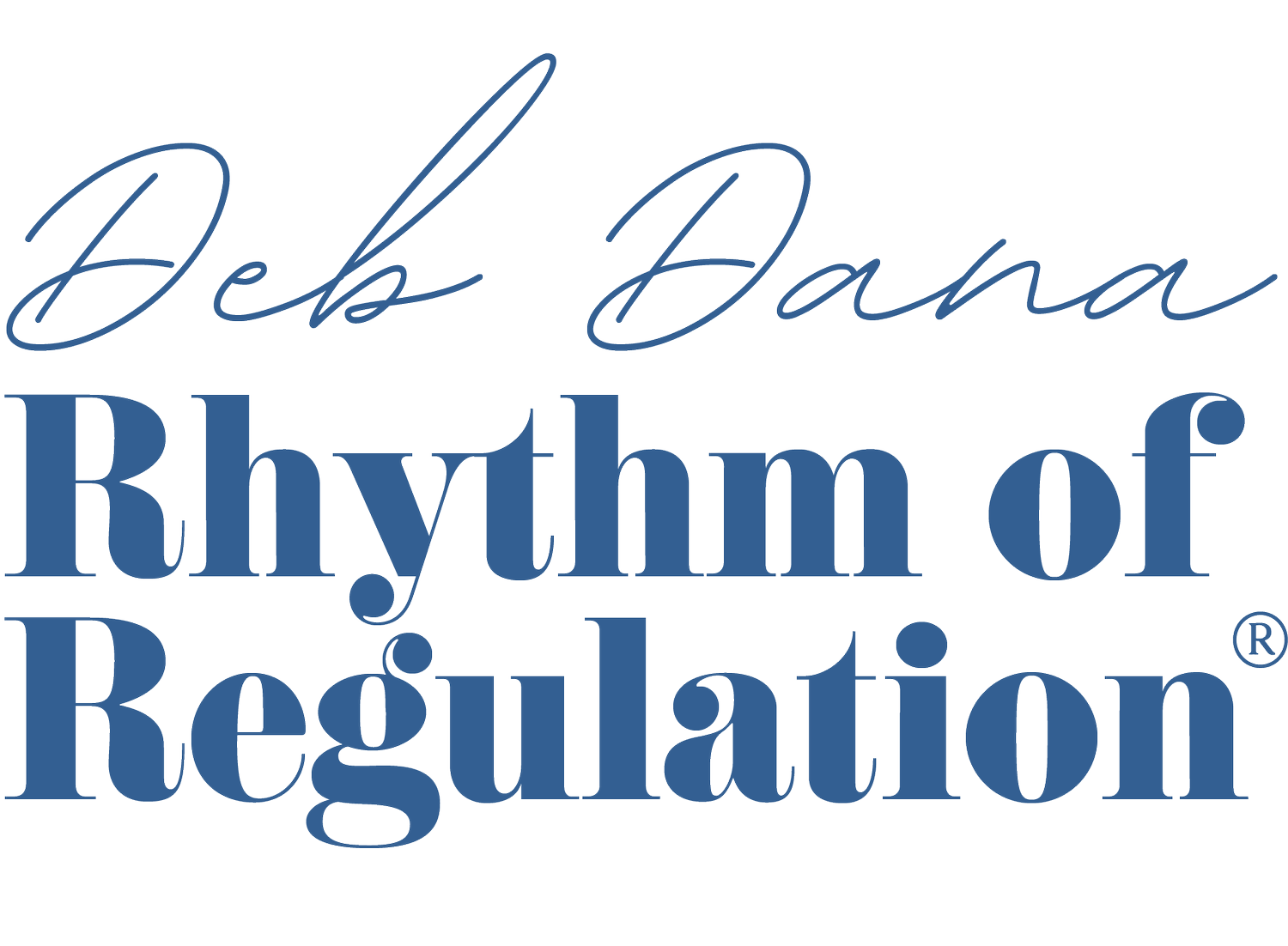
Foundations of Polyvagal Informed Practice Clinical Training Series
Deb Dana’s
An unparalleled professional training series by Deb Dana, LCSW, offering therapists, clinicians and helping professionals a deeply immersive and interactive learning journey to becoming Polyvagal-Informed.
Join Deb Dana and her team of Polyvagal-informed Senior Trainers and Consultants for a comprehensive, one-of-a-kind training series designed for professionals in the helping fields. Gain access to over 40 hours of learning materials, including live training sessions, Q&As, recorded webinars, demonstrations, readings, handouts, and official exercises—all carefully developed by Deb to support therapists and other practitioners build skill and confidence in integrating a Polyvagal-informed approach into their practice.
Deepen your understanding of Polyvagal Theory. Explore and befriend your own nervous system profile and autonomic patterns. Learn how to confidently integrate a Polyvagal-guided perspective, along with Deb’s renowned methodology, into your work with clients.
Deb’s flagship training series stands apart—it goes beyond theory, offering a deep dive into the clinical use of PVT and Deb’s unique framework that bridges the gap between knowledge and real-world clinical application. Step into the world of Polyvagal Theory with the guidance of Deb and her Senior Training Team, and gain practical tools to transform your professional practice.
Registration is Now Open for the Following Cohorts
-
April 2026 Cohort
Online + In-Person
Begins April 10, 2026
The live training sessions for this cohort are listed in Atlantic Time.
Note: This cohort includes an in-person retreat component in Halifax, Nova Scotia. Please contact us if you have any questions.
Click the button below to access a free preview, view the training schedule, meet the training team and register.
Space is limited to 36 participants
-
JOIN THE INTEREST LIST
Interested in being notified of upcoming Foundations Cohorts?
Click the button below to join the Foundations Interest List, and we will send you an email when registration opens for our upcoming 2026 cohorts.

The Autonomic Nervous System is at the Heart of Daily Living.…
...powerfully shaping experiences of safety and influencing the capacity for connection.
Through the organizing principles of hierarchy, neuroception, and co-regulation, Polyvagal Theory has offered us a new appreciation of how experience shapes the nervous system and the pathways that lead to healing.
With this updated map of the autonomic circuits of connection, mobilization and collapse, we now have practical ways to effectively help clients identify and interrupt patterns of protection and strategies to shape their systems toward the regulated state of safety and connection necessary for successful treatment.
Since the publication of her seminal book, The Polyvagal Theory in Therapy: Engaging the Rhythm of Regulation (Norton, 2018), Deb Dana's work has continued to transform how Polyvagal Theory can be applied in professional, therapeutic, clinical, and educational settings.
In this flagship series, which is Deb’s most comprehensive and immersive professional training available, participants will learn the language and landscape of the autonomic nervous system as they map their own unique autonomic pathways and discover how to become a regulated and regulating resource for their clients and communities.
Participants will then also learn, step-by-step, how to bring the power of Polyvagal Theory into their work, with practices designed to reliably help clients reshape their systems and rewrite the stories carried in their autonomic pathways.

Foundations Training Overview
Deb developed the Foundations training series as a comprehensive fundamentals program to help therapists, clinicians, and helping professionals from diverse backgrounds confidently and skillfully integrate a Polyvagal-guided approach into their clinical work.
This training equips professionals with practical insights, tools, and strategies to enhance their work with clients, regardless of therapeutic modality or setting. Participants engage in a rich, interactive learning journey, exploring their own nervous system patterns while developing Polyvagal-informed skills through personal reflection, clinical demonstrations, and hands-on application.
More than just conceptual learning, this series emphasizes experiential practice. Through recorded training videos, small group experiences, and engaging live-online sessions, participants move beyond theory into real-world integration, successfully applying a Polyvagal approach in their work with clients and communities.
This hybrid training series offers over 40 hours of live and on-demand learning and is structured into five comprehensive monthly modules:
Module 1: Getting to Know the Nervous System
Module 2: Autonomic Protection and Connection
Module 3: Resourcing Regulation
Module 4: Navigating the Hierarchy
Module 5: Integration and Ending

Training Structure
Each module includes self-paced study materials, featuring:
Approximately 3 hours of recorded teachings from Deb
Recorded session demonstrations
Detailed handouts, articles, and readings
Exclusive practice exercises and worksheets for your personal and professional use
In addition to self-study, each module will culminate in a live, 3-hour training session led by Deb’s Polyvagal-informed Senior Trainers. These interactive sessions provide guidance, support, and deeper insights into applying Polyvagal-informed interventions with confidence.
To further enrich the learning experience, the program also includes:
Three 90-minute experiential sessions led by Senior Training Team members, designed to bring Polyvagal Theory to life through practical application.
Four one-hour small group consultation sessions to provide additional opportunities for real-time connection with peers, focused discussion and direct support from Deb’s Polyvagal-informed Consultants in understanding the theory and applying the principles and practices with clients.
Two 90-minute live Q&A sessions with Deb, offering direct support as participants apply the framework in their client work.

Deepen your Learning with Small Group Consultations & Polyvagal Partnerships
Small groups and Polyvagal Partnerships are mindfully incorporated into the training experience to anchor your learning and help you stay connected with your fellow Foundations participants.
The large group of 36 is divided into three groups of 12. Each group is assigned to one of Deb's Polyvagal-informed Consultants as their point person for the duration of the training.
Each small group of 12 will be further divided into groups of four to create small consultation groups. Each consultation group will have four one-hour consultation sessions throughout the training series and will rotate between Consultants so participants can learn from each Consultant's range of experience and expertise.
Each participant will also pair up with someone from their small consultation group to create a Polyvagal Partnership. Polyvagal Partnerships offer the opportunity to connect with someone throughout the training to discuss material, share personal and professional experiences through the Polyvagal lens, practice new skills, and experiment with all things Polyvagal.

What You Will Learn
As you move through this training series, you will:
Learn the three organizing principles of Polyvagal Theory - neuroception, hierarchy, and co-regulation - and how they impact your daily life and clinical practice.
Befriend your nervous system as you get to know your autonomic patterns of connection and protection.
Develop ways to use your autonomic state to create an environment of safety for your clients.
Create autonomic maps and learn how to use them to guide clinical choices.
Learn techniques to effectively guide clients from a state of survival to safety and enhance their capacity for regulation.
Practice strategies to help clients identify and interrupt their familiar patterns of protection and to find and savor experiences of safety.
Develop skills in engaging the co-regulating pathways of the social engagement system to create safety in the therapeutic relationship.
Learn how to integrate a Polyvagal-guided approach into your existing professional practice, including support and guidance around developing your own launch plan.

The Foundations of Polyvagal Informed Practice training series is an invaluable guide to incorporating Deb's groundbreaking Polyvagal-guided methods, tools, and practices in the most effective way for your clients and your own development as a practitioner and helping professional.
Register for $2000.00 USD. Monthly payment plans are available.
We look forward to you joining us!
Frequently Asked Questions
-
The Foundations of Polyvagal Informed Practice training series is for therapists, clinicians and helping professionals of all backgrounds and fields who are looking to gain a deeper understanding of Polyvagal Theory and how to apply it to their work with clients.
This program is appropriate for all licensed clinicians including social workers, psychologists and clinical counselors. As an entry level training, no prior experience with Polyvagal Theory is required.
The training focuses on both participants’ understanding of their own autonomic responses and application with clients. The exercises are geared towards working in a clinical setting.
Participants from all the helping professions are welcome. Those who are not from a traditional clinical licensure program are encouraged to speak our administrative team before registering.
-
The Foundations of Polyvagal Informed Practice is a fundementals training program. This comprehensive training series was developed by Deb and designed specifically for therapists, clinicians and helping professionals to bring her successful methodology and clinical insights to their own practice, clients and communities. No matter what approach or modality you already use in your work, Deb's framework will integrate beautifully and add to your skills as a therapist or practitioner.
There is no other training program in the clinical application of Polyvagal Theory that practically and so thoroughly teaches these concepts, tools, methods and practices - that have been tried and tested in professional application - and which are a current topic in the world of trauma treatment across the globe.
Deb's Foundations training is also unique in that it is an immersive hybrid training model. The series combines comprehensive self-study material - 15 hours of recorded webinars that participants have lifetime access to - as well as an array of live training and practice opportunities and two live Q&A periods with Deb where participants can ask questions specific to their learning journey and work.
And because of its online format, participants can join from anywhere in the world, as long as the time zones are compatible to attend the live sessions.
-
By registering for this immersive training, participants are making a commitment to watch all the prerecorded training videos and attend all live training, experiential and consultation sessions. However, if you're unable to attend a live session or need to view it after the live date, you'll have access to the recording for 30 days after the live session is uploaded to the learning platform.
*Please note that for privacy purposes the live experiential and small group consultation sessions are not recorded and therefore replays will not be available to those who miss these sessions.
-
Yes. You'll get lifetime access to Deb's comprehensive training materials, including her recorded sessions, slides, handouts, and official exercises to add to your clinical toolbox and use with your clients. With this lifetime access you can return to the self-study materials at any time after the training ends to refresh your learning and continue building your skillset.
-
Following the completion of Foundations of Polyvagal Informed Practice, participants will receive a Certificate of Completion and may refer to themselves as Polyvagal-informed in their work with clients. Participants are encouraged to use this term and reference the completion of the Foundations training on their websites, CVs, and other relevant professional materials to convey their level of knowledge and skill with regards to the clinical application of Polyvagal Theory.
Please note: There is no formal certification process in existence for becoming Polyvagal Informed or program available through any organization to become a certified polyvagal clinician.
As a founding member of The Polyvagal Institute, Deb adheres to the principle, supported by the Institute, that helping people deepen their learning and use of Polyvagal Theory in clinical work is an essential element in the healing process. However, there is no path to certification.
-
To receive the Certificate of Completion for the Foundations training series, participants need to watch all the prerecorded videos and attend all the live sessions. We understand that life happens and unplanned scheduling conflicts occur. In these cases, watching the replay of the live session (where available) is an acceptable alternative. If you need to miss a live session, please reach out to your assigned Consultant or a member of the Senior Training Team to let them know and create a plan to get caught up on anything you might have missed.
-
At this time, there are no continuing education credits available.
-
A full refund is available, minus a $100.00 cancellation service fee, for cancellations made before the training start date. For cancellations made after the training begins, a credit is available. This credit may be applied to another Rhythm of Regulation online course or training, with possible exceptions being those with prerequisites.
-
Yes. The registration fee can be paid in full at the time of enrollment or in 4 monthly installments of $500.00.
-
Yes. In acknowledging that financial and economic situations, as well as access to learning opportunities, vary across our global community, we endeavor to make the Foundations training accessible and inclusive to as many individuals as possible. Therefore, we offer a limited number of partial scholarships to those facing financial hardship or who would otherwise be deterred or unable to access the Foundations training series. Please contact us for more information on how to apply.
-
The Foundations training series is structured into five monthly modules. Each module includes approximately three hours of self-study content, featuring prerecorded video lessons and demonstrations with Deb, and a three-hour live training session with the senior training team. Relevant readings are also available within each module, and while we highly recommend participants complete these as well to support what they are learning, they are not required reading.
We understand that individual learning styles and paces vary, so the time required to complete the learning content may differ for each participant. We encourage you to assess your own schedule and allocate sufficient time to watch all pre-recorded content and attend the live sessions.
In addition to the module content, the training includes:
Three 90-minute live experiential sessions
Two 90-minute live Q&A sessions with Deb
Four one-hour live small-group consultation sessions
The schedule for live training sessions is made available for each cohort once registration opens. This allows participants to confirm their availability and plan their learning schedule accordingly.
Have additional questions about the Foundations training series? We're happy to help. Contact us at: rorassist@gmail.com
Registration is Now Open for the Following Cohorts
-
April 2026 Cohort
Online + In-Person
Begins April 10, 2026
The live training sessions for this cohort are listed in Atlantic Time.
Note: This cohort includes an in-person retreat component in Halifax, Nova Scotia. Please contact us if you have any questions.
Click the button below to access a free preview, view the training schedule, meet the training team and register.
Space is limited to 36 participants
-
JOIN THE INTEREST LIST
Interested in being notified of upcoming Foundations Cohorts?
Click the button below to join the Foundations Interest List, and we will send you an email when registration opens for our upcoming 2026 cohorts.

